What follows is a comprehensive look at many pieces of information we acquired over our four days at Gen Con. This spans the board gaming sphere primarily, as well as a few other areas that were worth mentioning.
Mind you, it’s impossible to catch everything at the con, even one with the reduced footprint for 2021, and though I certainly try to gather as much intel as I can while gabbing along for four days, there’s simply too much for any one person to process on the expo floor, let alone the convention writ large. So I apologize if I left anything or anyone out. Even if you spend the entirety of the expo hall’s 30 hours on the floor (and I do), it leaves precious little time to stop at every booth you want to. This was especially true this year given that it’s quite literally been years since I’ve seen many of the people on the other end in person. Still, as I spent the majority of my daytime hours running around gathering information per usual, I’m eager to share my notebook full of tidbits over the coming days. What we have here, therefore, is the lion’s share of pertinent parts to that endeavor.
So, let’s get started. Without further ado, I give to you our Gen Con 2021 Recap: Surreal Edition, with Part 2, the Crowdfunders.
Also See:
- Part 1 – A Foreword: Conventioning During COVID
- Part 2 – Active Crowdfunding Projects
- Part 3 – The New Hotness
- Part 4 – The Surprise Hits
- Part 5 – News & Announcements
- Part 6 – What Comes Next
Active Crowdfunding Projects
For the first part of the recap, we want to mention the ongoing Kickstarters and Gamefound campaigns that were happening during the convention or launched immediately afterwards, and a number of them don’t have a lot of time left. Hence why we’re starting with those. In addition, there were a handful of titles present at Gen Con that ended just a few days prior which may be worth a second look if you missed them. These include:
- CoLab, an action selection and tableau-engine-building game of mad scientists by Portal Dragon. (Edit: It appears Portal Dragon halted the campaign preemptively with the intention of relaunching in the near future.)
- The dual campaign for The Gardens, a casual card drafting and tableau building game about strategically constructing a botanical garden, as well as the roll-and-write version A Walk in the Park, both by by Grail Games and Matagot.
- The whimsical Mythic Mischief by IV Games, a game about magical students using asymmetric powers to get one another caught by the guardian Tomekeeper while navigating an ever-changing map.
- The Rebirth expansion to the massive free-for-all wizard brawling game of miniatures-meets-deckbuilder in Black Rose Wars by Ludus Magnus Studio and Ares Games.
As for the active projects:
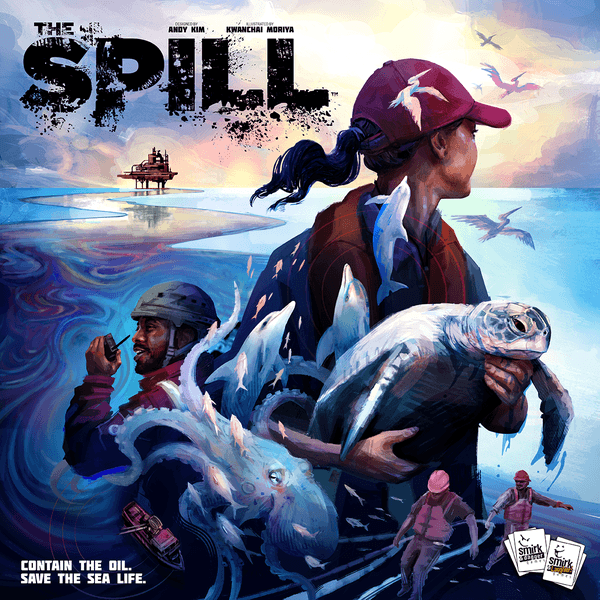 The Spill by Smirk & Dagger Games. When it comes to board game themes, two things are unfathomably true. The first is that some gamers care very little about a game’s premise while to others a theme is a primary factor whether or not the game will have any interest to them. The second is that although the hobby zeitgeist is slowly trending away from such a mindset, there remains a lingering apprehension about games with topical themes. Topics like, say, trying to deal with a ruptured oil well causing an ecological disaster. So it says something that The Spill has slowly been garnering more and more attention throughout its campaign.
The Spill by Smirk & Dagger Games. When it comes to board game themes, two things are unfathomably true. The first is that some gamers care very little about a game’s premise while to others a theme is a primary factor whether or not the game will have any interest to them. The second is that although the hobby zeitgeist is slowly trending away from such a mindset, there remains a lingering apprehension about games with topical themes. Topics like, say, trying to deal with a ruptured oil well causing an ecological disaster. So it says something that The Spill has slowly been garnering more and more attention throughout its campaign.
Though the Smirk & Dagger booth was quite busy showing off its latest hit with Night Cage there was still ample activity and interest in quick demos of The Spill. In this Pandemic-esque style co-op, players portray a task force of scientists and engineers sent to deal with a ruptured offshore oil well. In what they’re billing as a “reverse tower defense” game, The Spill has you frantically working to try to contain oil gushing from a centralized dice tower. In addition to stemming the tide of the oil flow itself, you and your team must use its limited time and resources to also clean up the ever-spreading oil slick and rescue as much of the affected marine life in the area as possible. Only through a combination of all three spheres are you able to successfully win. It’s a game with an important environmental message that also happens to be challenging and fun, and you have until today (9/24) to back before it slips away.
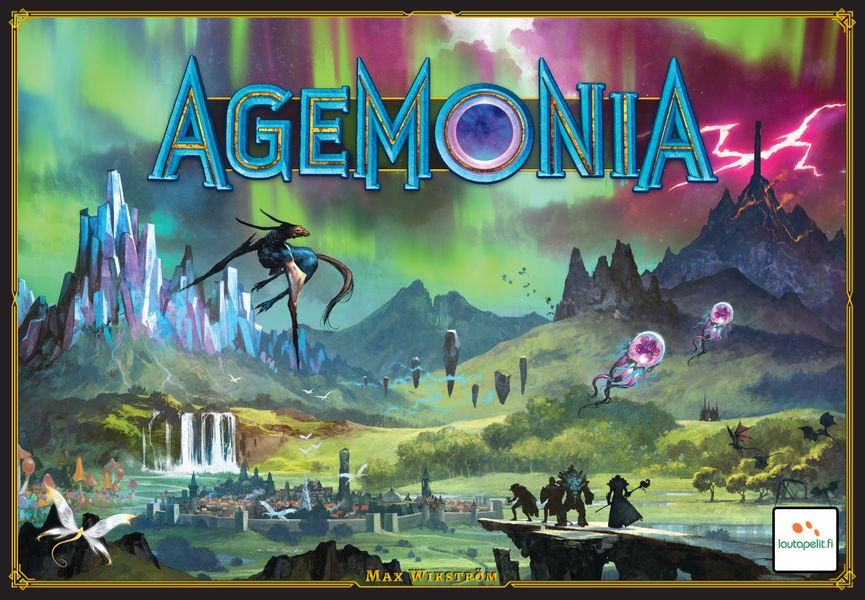 Agemonia by Lautapelit.fi. Though Finnish publisher Lautapelit didn’t have a booth this year at Gen Con, they still managed to get a number of people to scope out their newest and most ambitious title since they debuted Eclipse in 2011. But if the past is prologue, it at least demonstrates that this publisher knows how to tackle a bigger project. Which is good, because just from the looks of it Agemonia fits the fantasy-laden bill.
Agemonia by Lautapelit.fi. Though Finnish publisher Lautapelit didn’t have a booth this year at Gen Con, they still managed to get a number of people to scope out their newest and most ambitious title since they debuted Eclipse in 2011. But if the past is prologue, it at least demonstrates that this publisher knows how to tackle a bigger project. Which is good, because just from the looks of it Agemonia fits the fantasy-laden bill.
At its core, Agemonia is a cooperative scenario-driven campaign style board game. Propelled by its story, tinged with key moralistic decision-making by its characters, the game boasts ample material for over 30 scenarios and dynamically-created maps. The gist is that your magic-infused world is suddenly beset with unstable upheavals on a cataclysmic level, but no one is exactly sure why. This disruption has set numerous factions against one another driven by fear, necessity, or opportunity, making the day-to-day quite unpredictable. Throughout the campaign your band of heroes will explore the land, take on missions, and perhaps even unravel the mystery at the heart of it all. Linking together familiar fantasy-style story tropes alongside clever resource management and a turn order structure based around the speed of your actions, Agemonia easily has a lot to explore both within the game and the world it inhabits. If you’re up for the challenge you have until 9/28 to book passage.
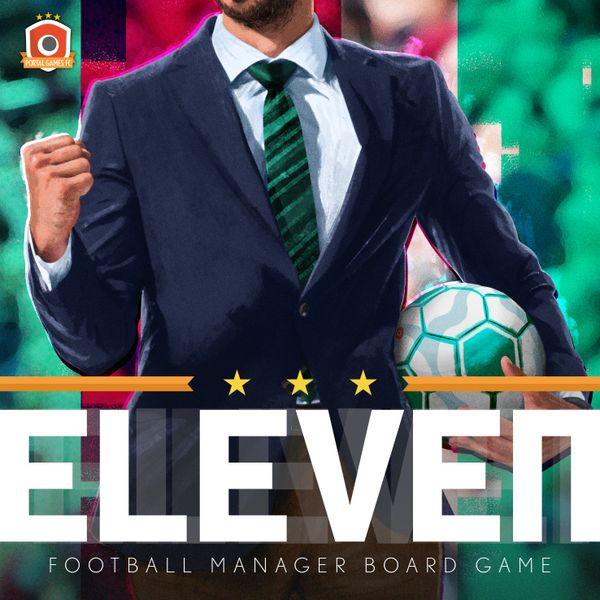 Eleven: Football Manager by Portal Games. Although Portal had a couple new games being shown off at this year’s Gen Con, a lot of the enthusiasm at the booth from both attendees and staff inevitably kept drifting over to their prototype of Eleven, the upcoming economic Euro game about managing a soccer team. It’s a seemingly simply concept, but it’s one that several titles have attempted in the past with rather mediocre results. Eleven, I have to say, appears it may have finally found the right formula. And this is coming from someone who has little interest in the sport otherwise.
Eleven: Football Manager by Portal Games. Although Portal had a couple new games being shown off at this year’s Gen Con, a lot of the enthusiasm at the booth from both attendees and staff inevitably kept drifting over to their prototype of Eleven, the upcoming economic Euro game about managing a soccer team. It’s a seemingly simply concept, but it’s one that several titles have attempted in the past with rather mediocre results. Eleven, I have to say, appears it may have finally found the right formula. And this is coming from someone who has little interest in the sport otherwise.
Ultimately this shouldn’t be a huge surprise – Portal has a fairly decent track record in general, let alone for games that work both mechanically and thematically. Eleven leans into both sides of this as you manage a soccer team throughout an entire season, which includes recruiting players, building up your stadium, recruiting sponsors, and of course, winning as many of your games as possible. It also shouldn’t be a surprise that this game, which ends next week (9/28), is already well past funding. But if you want to be one of the first to kick this one around, there’s still time to sign up.
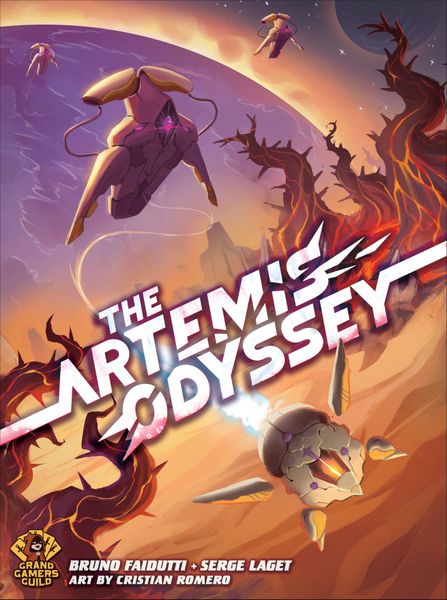 The Artemis Odyssey by Grand Gamers Guild. One of the most quirky things about The Artemis Project is that it somehow simultaneously manages to be both a prequel and a sequel to their surprise 2019 hit The Artemis Project. In the original dice worker placement title, players were drilling the frozen moon of Europa to establish a colony and expand humanity further into the solar system. The Artemis Odyssey, which runs until 9/28, is the thematic followup to that endeavor – where humanity has now gone beyond the solar system in an effort to discover and terraform new planets in a new galactic space race. Yet it also predates the original by many years, as Artemis Odyssey is effectively a reskinned and streamlined revamp of 2009’s Ad Astra.
The Artemis Odyssey by Grand Gamers Guild. One of the most quirky things about The Artemis Project is that it somehow simultaneously manages to be both a prequel and a sequel to their surprise 2019 hit The Artemis Project. In the original dice worker placement title, players were drilling the frozen moon of Europa to establish a colony and expand humanity further into the solar system. The Artemis Odyssey, which runs until 9/28, is the thematic followup to that endeavor – where humanity has now gone beyond the solar system in an effort to discover and terraform new planets in a new galactic space race. Yet it also predates the original by many years, as Artemis Odyssey is effectively a reskinned and streamlined revamp of 2009’s Ad Astra.
In both iterations, the game remains similar: each turn players place one of five different action cards onto a shared planning board, which are then sequentially resolved, with the card’s owner receiving a benefit. Anticipating what you think your opponent will do is therefore key to gaining tactical advantages throughout this interstellar competition. We’d enjoyed Ad Astra in the past but it’s never one we ever owned ourselves. Now is that chance., as whether you’re revisiting it anew or for the first time, The Artemis Odyssey is already off to a decent launch.
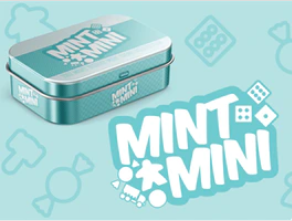 Mint Mini by Poketto. Whether it’s travel versions, dice adaptations, or the litany of roll-and-writes of recent years, there’s a small but passionate percentage of gamers who simply love taking an existing mechanic or title and making it more compact. And though we’re not among those who enjoys a scaled-down game simply for the sake of it, it’s hard to deny those efforts are often pretty successful. The hobby has certainly seen a share of these over the years, including Gamelyn’s Tiny Epic series and Poketto’s own Mint series – small but complete games that can fit inside a mint tin.
Mint Mini by Poketto. Whether it’s travel versions, dice adaptations, or the litany of roll-and-writes of recent years, there’s a small but passionate percentage of gamers who simply love taking an existing mechanic or title and making it more compact. And though we’re not among those who enjoys a scaled-down game simply for the sake of it, it’s hard to deny those efforts are often pretty successful. The hobby has certainly seen a share of these over the years, including Gamelyn’s Tiny Epic series and Poketto’s own Mint series – small but complete games that can fit inside a mint tin.
Well, Poketto appears to be doubling down with Mint Mini, as it is a mint tin game consisting of…micro versions of their other five Mint Tin titles. Billed as a lightweight drafting game where players compete to play super condensed versions of the other games of the Mint Series line, Mint Mini angles itself as a great option for players to try something when time is short or as a launchpad to other games. The campaign, which ends in about a week on 9/30, is already well past funding – in part thanks to a customized lunchbox capable of holding all six of the Mint Tin titles. Which even we have to admit is pretty cool looking.
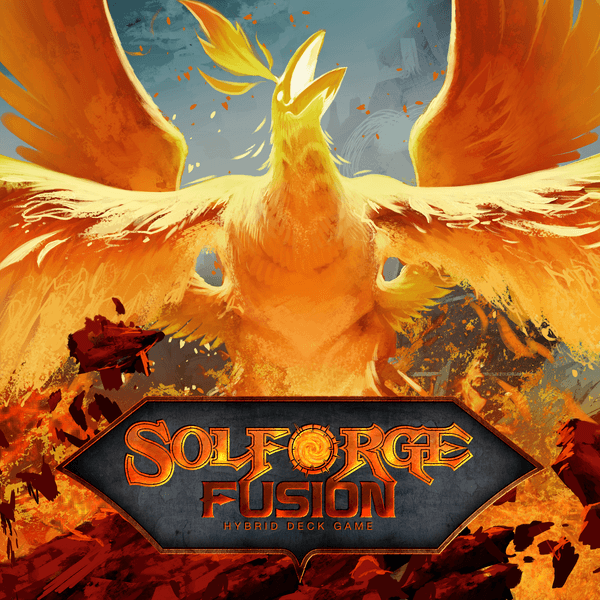 SolForge Fusion by Stone Blade Entertainment. Like several publishers Stone Blade opted to not make the trip to Gen Con 2021, but owner Justin Gary was on hand to showcase their latest title, SolForge Fusion – which is best described as Magic meets KeyForge meets Battle Line. Fusion is a collaboration between Magic’s own Richard Garfield and Gary himself, who is responsible for creating Ascension. It is an effort to create a physical version of the short-lived digital CCG SolForge from a few years back – which Garfield also helped create and SBE produced. So it’s understandable if this all gets a little confusing.
SolForge Fusion by Stone Blade Entertainment. Like several publishers Stone Blade opted to not make the trip to Gen Con 2021, but owner Justin Gary was on hand to showcase their latest title, SolForge Fusion – which is best described as Magic meets KeyForge meets Battle Line. Fusion is a collaboration between Magic’s own Richard Garfield and Gary himself, who is responsible for creating Ascension. It is an effort to create a physical version of the short-lived digital CCG SolForge from a few years back – which Garfield also helped create and SBE produced. So it’s understandable if this all gets a little confusing.
In this new analog card game form, Fusion has players take two algorithmically-generated unique half-decks of different cards and factions and shuffle them together for a single playthrough. The main thrust of the game comes through laned creature combat, where you are trying to create openings in your opponent’s defenses and, ultimately, bring their life to zero. Throughout the game cards you play can become more powerful, creating new strategic opportunities. It’s an ambitious attempt at a reboot for the SolForge name, but there definitely is a lot of potential here for the competitive card players among us. The campaign, which ends on 9/30 and is well past funding, also advertises that your unique physical decks will be also playable online, and they have large desires for future Organized Play events.
 Sushi Boat by Japanime Games. I will freely admit that, traditionally, Japanime Games has not released many titles that really fit our personal gaming preferences or those of our audiences between a heavy focus on anime-themed games that didn’t really entice us and an awful lot of fan service artwork. This is a brand identity Japanime is aware of, and they have been taking small steps over the last couple years to broaden their appeal by producing games for potentially wider audiences. The latest example of that is the lightweight card and memory game Sushi Boat – which definitely looks pleasantly kawaii.
Sushi Boat by Japanime Games. I will freely admit that, traditionally, Japanime Games has not released many titles that really fit our personal gaming preferences or those of our audiences between a heavy focus on anime-themed games that didn’t really entice us and an awful lot of fan service artwork. This is a brand identity Japanime is aware of, and they have been taking small steps over the last couple years to broaden their appeal by producing games for potentially wider audiences. The latest example of that is the lightweight card and memory game Sushi Boat – which definitely looks pleasantly kawaii.
In this straightforward title, players are patrons visiting a Japanese kaiten sushi restaurant looking to stuff one’s face with as much sushi as possible. Throughout the game, new sushi dishes are added to the conveyor belt, pushing existing uneaten dishes off the board. Turns primarily consist of moving your marker to an open space in the restaurant and then either consuming the adjacent dish or tipping the staff member at that location to use their special action. Endgame scoring is based on both sets of different sushi types and eating consecutive plates of the same color. The catch is that you cannot look at past eats and must remember the contents and order of all that food now in your stomach. Similarly, there are times when you must wager on which dishes are currently under the hidden part of the conveyor belt, meaning that you also have to keep tabs on uneaten dishes as well. Sushi Boat is deliciously simple enough, but that doesn’t necessarily mean easy. If this sounds like something you’d like to snack on, you have through 10/5 to back it.
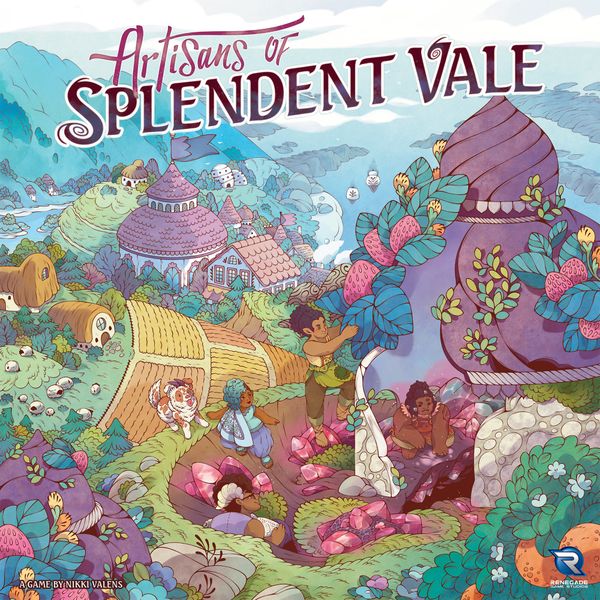 Artisans of Splendent Vale by Renegade Game Studios. As has already been mentioned, most publishers at Gen Con 2021 could easily be split into those who already released their summer titles and those who (at the the behest of the shipping gods) hope to have their Q3 games available by November.
Artisans of Splendent Vale by Renegade Game Studios. As has already been mentioned, most publishers at Gen Con 2021 could easily be split into those who already released their summer titles and those who (at the the behest of the shipping gods) hope to have their Q3 games available by November.
Renegade was one of a handful of exceptions, displaying at least a half dozen games for their debut appearances. Most of them garnered various amounts of attention for their respective audiences and Renegade inevitably sold out of several of them by the Sunday close – all what you’d normally expect for Gen Con. Yet I have to admit that of all their offerings, one title that especially caught my attention most wasn’t even being demoed, let alone for sale. That was Artisans of Splendent Vale.
Launching just after Gen Con’s conclusion, Artisans is an expansive and highly detailed co-op based sandbox style legacy game. Full of adventures and storytelling, players form a band of skilled artisan crafters exploring their mystical world and overcoming the various challenges they come upon. As the box size alludes to, Splendent Vale is brimming with beautiful illustrations, a massive amount of campaign material to trek through, and a wonderfully diverse cast of characters leading the way. And if it seems like the kind of journey you’d like to take with them, you have until the campaign closes on 10/8 to sign up.
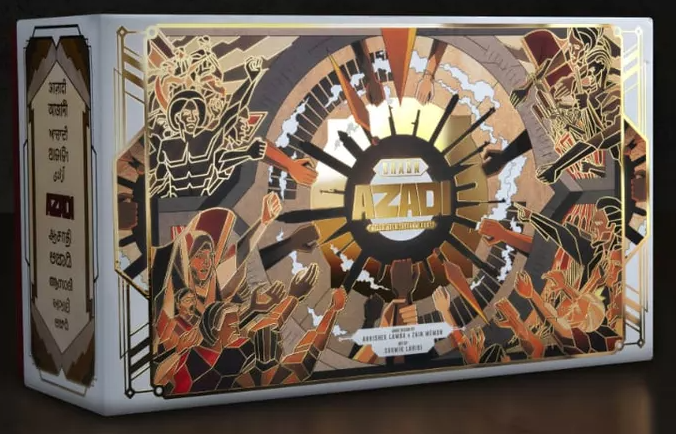 SHASN: AZADI by Memesys Culture Lab. There is an oft quoted line of unknown provenance stating ‘history does not repeat itself, but it does rhyme’. When it comes to first exposure to all things SHASN, this appears to be true. Our first gleam into this wonderful political campaign simulation game of area control and resource management came by happenstance at Gen Con 2019 as it was largely being shown off ad hoc at the time. We nevertheless enjoyed what it was doing so much that when it finally became available stateside it ended up becoming our Indie Spotlight title of March 2021. Fast forward two years later, and once again I absently stumbled upon a copy of SHASN’s expansion, AZADI. While the game was being used more for display purposes than for demoing I sadly wasn’t able to give it a whirl, but thanks to its current Kickstarter, anyone who pledges before 10/9 will be able do do so in the months ahead.
SHASN: AZADI by Memesys Culture Lab. There is an oft quoted line of unknown provenance stating ‘history does not repeat itself, but it does rhyme’. When it comes to first exposure to all things SHASN, this appears to be true. Our first gleam into this wonderful political campaign simulation game of area control and resource management came by happenstance at Gen Con 2019 as it was largely being shown off ad hoc at the time. We nevertheless enjoyed what it was doing so much that when it finally became available stateside it ended up becoming our Indie Spotlight title of March 2021. Fast forward two years later, and once again I absently stumbled upon a copy of SHASN’s expansion, AZADI. While the game was being used more for display purposes than for demoing I sadly wasn’t able to give it a whirl, but thanks to its current Kickstarter, anyone who pledges before 10/9 will be able do do so in the months ahead.
Conceptually, AZADI takes the same ideas about building ideologies, influencing factions, and forming coalitions of powers and wraps it all in a more dire set of scenarios. Rather than recreate another set of democratic elections, AZADI presents a series of revolutionary scenarios wherein players must (begrudgingly) work cooperatively as part of a revolutionary group trying to overthrow their Imperial masters and attempt self-rule instead. However, in the end only one player can lead their new nation to prosperity. While largely using the same DNA as the base game, AZADI offers a distinctly more precipitous board state and volatile outcomes while maintaining the through-line that change, no matter the form, typically does not come easy.
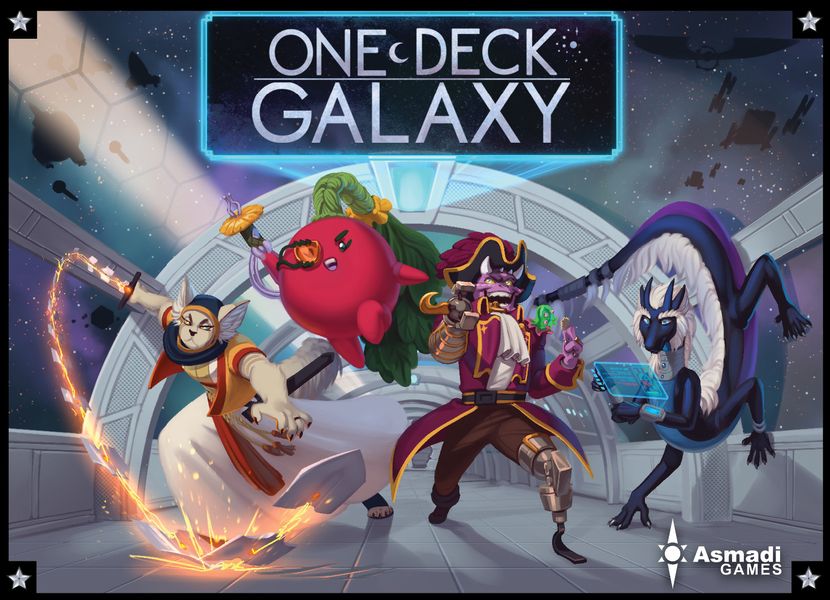 One Deck Galaxy by Asmadi Games. Despite the reduced size of the the Gen Con expo hall this year and the overall number of bodies present, there were still enough “blink and you’ll miss it” booths scattered throughout the unusually sparse aisles. One such instance was Asmadi Games, whose small smattering of tables were nearly obfuscated by its longtime convention partner Foam Brain Games. Which would have been a shame, because what space it had this time around was almost exclusively used for showing off the new card and its newest dice allocation game One Deck Galaxy.
One Deck Galaxy by Asmadi Games. Despite the reduced size of the the Gen Con expo hall this year and the overall number of bodies present, there were still enough “blink and you’ll miss it” booths scattered throughout the unusually sparse aisles. One such instance was Asmadi Games, whose small smattering of tables were nearly obfuscated by its longtime convention partner Foam Brain Games. Which would have been a shame, because what space it had this time around was almost exclusively used for showing off the new card and its newest dice allocation game One Deck Galaxy.
For those familiar with its predecessor, One Deck Dungeon, much of the underlying framework should be familiar. This includes a focus on working solo or as a team through a series of locations by rolling and allocating a pool of dice, leveraging multi-use cards to upgrade and improve various facets of your exploits, and facing a steadily increasing array of foes. Yet where Dungeon’s focus was on one of survival and sheer progression, One Deck Galaxy expands on the necessity for planning ahead to succeed – which is not an easy task in a game primarily fueled by rolling and manipulating dice. Doubly so when also factoring in enemy bosses to overcome. Though similar in style and size, this one undeniably has more strategic options to consider as you strive to grow your expansive interstellar organization. Which is probably why the campaign has already rocketed past its funding goal. Though if you’re up for an adventure that trades in a physical saber for an energy one, you have until 10/15 to join in.
That’s all for now! Check back for the next segment when we talk about some of the most talked about games to make their Gen Con debut.
